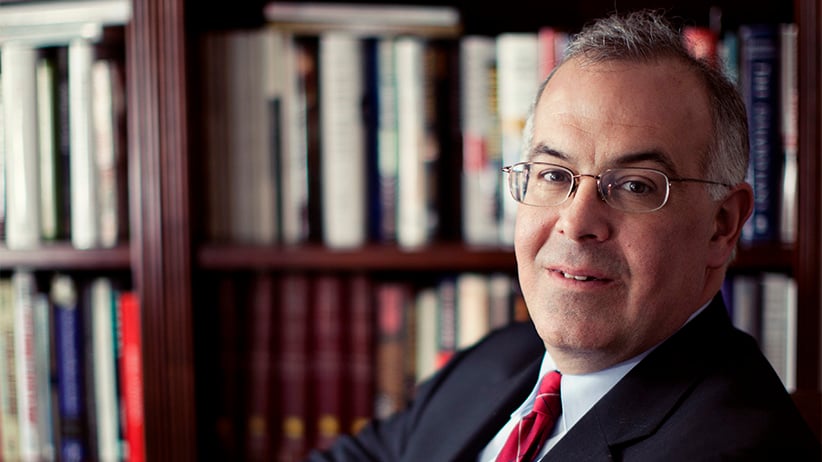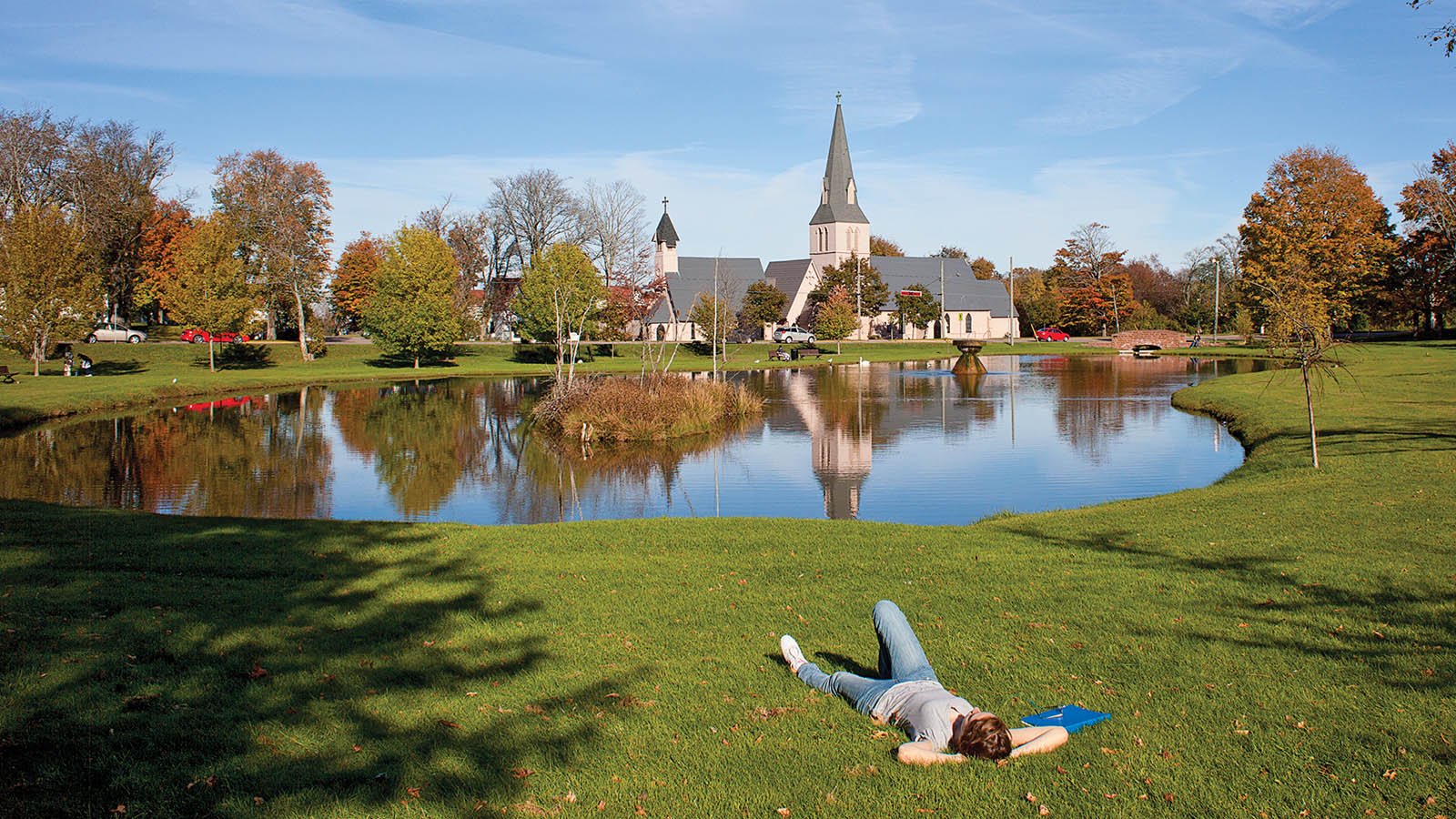David Brooks: ‘To have a fulfilling life you have to make promises.’
The columnist and author explains why the measure of our lives depends on how well we commit
Conservative New York Times columnist David Brooks is photographed in his office at the New York Times bureau in Washington, D.C. on Friday, January 27, 2012. (Melissa Golden/Redux)
Share

For the record, here is University of Pennsylvania’s Baccalaureate Address by David Brooks, an author and New York Times columnist:
Graduates of the Class of 2016.
Tomorrow you will walk across that stage and receive your diplomas from the University of Pennsylvania. I am honored to be part of your pregaming activities.
As you know I was asked to be your speaker today because I am the author and star of a hit Broadway musical, “Gutmann: The Hip Hop Adventures of an Inspiring College Administrator.”
Many of you were moved by the songs from that musical: The one I did with Kanye and Jay-Z called “Provosts In Paris” My tribute to the Wharton School, “Mo Money, Mo Ego.”
No, I’m just kidding. I’m not actually a hip hop star, though my lifestyle was once the subject of a Snoop Dogg song called “Gin and Juice.”
Related reading: Lin-Manueal Miranda: ‘Your stories are essential’
I’m actually here to help you prepare for the big event tomorrow. One of the things I always try to tell graduates is that when you get your diploma it’s always nice to tip the college president 10 or 20 bucks just to show she did a good job.
It’s also nice to slip the baccalaureate speaker a few bills—maybe two or three thousand.
On these occasions I also always try to inspire students by telling them about the glittering possibilities in front of them.
Within just a few short years many you will be sleeping on your parent’s couches while working for a semi-functional NGO. Others of you will have thrilling consultant careers, working on power points presentations past midnight at the Topeka Comfort Inn.
I’m here to help you navigate these exciting possibilities.
I’m here to help you take advantage of the skills you learned at Penn, like dominating classroom discussion after having done none of the reading.
I’m here to urge you to lives of public service, working on Capitol Hill while bringing the nation’s top leaders coffee and sexual tension.
Mostly I’m here because Paul Krugman was busy this weekend.
So yes, I’m truly honored to be at the University of Pennsylvania.
And I’d like to talk to you about the big transition you will make tomorrow, from being promising to making promises. We live in a society that puts a lot of emphasis on freedom and personal choice. But the big thing I’ve learned recently is that if you spend your years keeping your options open you will lead an impotent, fragmented life.
Related reading: Sheryl Sandberg: ‘The lessons I learned only in death’
You will wander about in the indeterminacy of your own passing feelings and your own changeable heart. Life will be a series of temporary moments, not an accumulating flow of accomplishment. You will never be all-in for anyone or any path, because your eyes will always be wandering to some other possibility. You will lay waste to your powers, scattering them in all directions.
To have a fulfilling life you have to make promises. You have to surrender some freedom of choice to taste a higher freedom, the freedom that comes after you’ve settled on a direction, chained yourself to a cause and enlarged your capacities.
It is precisely our restraints that liberate us for that higher freedom. You have to chain yourself to years of piano practice to have the freedom to really play.
To lead a fulfilling life, most of us make four big commitments: to a spouse and family, to a vocation, to a faith or philosophy and to a community. The measure of our lives depends on how well we choose these four enduring commitments and how well we execute on our promises to them.
Of these four commitments, only the marriage decision involves an arranged ceremony at an altar, but all forms of commitment require a vow of dedication, an investment of time, and act of faith and a willingness to leap headlong down a ski run that is steeper and rockier than it appears.
Up until tomorrow, promising was an adjective used to describe you. When people call you promising they were judging you by their criteria. Starting tomorrow promising becomes a verb. You will begin to make vows. Now it’s your criteria that matters.
Many of you will be more boring at age 35 than you are right now. For those who are, it’ll be because you mindlessly assented to the conventional criteria of success.
So how do you choose what to promise your life to? How do you choose a career or vocation, who to marry or what cause or community you should dedicate yourself to?
You can’t analyze your way through these problems. You don’t have enough data about who you will be in 20 years. You don’t know how the experience of say becoming a parent or going to med school will turn you into a different person.
You can only make long commitments if you understand the permanent loves that are latent within your own heart. One thing you have to do is to try to figure out what you really desire, which is a surprisingly hard thing to know.
You can start by observing your own behavior: List the three or four things you have enjoyed doing most in life. Do they line up in a row or point in a single direction? Did they all involve the developing world or gathering people for conversation? If so, you probably should continue along one of those lines.
Another thing you can do is keep a journal. If you write only for yourself then eventually honesty will come out and you become more articulate about your own latent desires.

Or you can ask yourself a set of sneaky questions question designed to get glimpses at your hidden self.
For example, you can ask yourself: What is the opposite of boring? What subject do I read about for fun and seems endlessly fascinating to me?
A marriage is a 50-year conversation. Have I met a person who I can talk to for that length of time?
Or you can ask, What would I do if I weren’t afraid? Fear is a surprisingly good GPS system. It signals that you really want something, even if that something is on the other side of social disapproval.
Or you can ask, What pains am I will to tolerate? If you’re willing to tolerate the pains of boot camp, then you probably really want to be a soldier.
Along side the phase of questioning and reflection there’s the phase of experimentation–trying on different jobs or people or places to see which ones fit.
If your going to commit to something for decades or life it should have, as Martin Luther King once put it, three qualities. First, length. You should be able to flourish in it for a long time. Second, breadth. You should touch a lot of people. Third, height. It should pull your gaze upward and put you in contact with transcendent truth.
As my friend Fred Swaniker put it, the problem you dedicate your life to should be a big problem. You’re Penn graduates. You are gifted enough to take on the worlds biggest needs. It should be something your life history has made you uniquely qualified to address. You should care enough that you wake up in the middle of night worrying and obsessing about this thing.
Most of all, the things you commit yourself to should satisfy your yearning for righteousness. We all long for a lot of things. We like affirmation, status, maybe a little money, fun and sex. But though we don’t talk about it as much, and don’t even have a word for it, we are also all born with a spiritual hunger to lead a life of meaning. Religious or not, we all hunger for moral fullness, for purpose and inner joy. If we don’t get it, we end up dry, unsatisfied, twisted and self-loathing.
It’s like this: There is a part of in each of our souls that is like a reclusive leopard. This is the part that doesn’t care about money or status or Facebook or any of the everyday things. The leopard is the part of us that feeds off transcendence, that seeks an awareness of one’s place in the cosmic order, a feeling of connection to unconditional love, truth, justice, beauty and home.
For long periods the leopard is up in the forest high in the mountains. You may forget about him for long stretches. But from time to time out of the corner of your eye, you glimpse the leopard, just off in the distance trailing you through the tree trunks.
There are spare moments when you vaguely or even urgently feel his presence. This can happen agonizingly, in the middle of one of those sleepless nights, when your thoughts come, as Christian Wiman puts it, like a drawer full of knives.
The leopard can visit during one of those fantastic moments with friends or family–when you look out at the laughing faces and you are overwhelmed by gratitude—when you feel called to be worthy of such undeserved happiness, joy and grace.
The leopard can come during moments of suffering, when you are forced to peer into the deepest cavities of your self and you want to how you can connect this moment of suffering to a larger story of redemption.
And then there are moments, inevitable in every life, but maybe more toward middle or old age, when the leopard comes out of the hills and he just sits there in the middle of your doorframe. He stares at you, inescapably, eye to eye and face to face, implacable and unmoving. He demands your justification. What is your purpose? What is your mission? For what did you come? There are no excuses at that moment. Everybody has to throw off the mask.
Some people have no answers and have given those questions no thought. They die knowing that and maybe trying to suppress that awful knowledge.
But we all know people, on the other hand, who have led their lives through a moral lens, who can look at the leopard face to face exposing their great loves and their great brokenness.

The people who look at life through a moral lens inverse the normal logic of life. Normally when we’re making the big decisions we try to follow a straightforward cost-benefit logic. Does this meet my needs? Does this work for me? Am I getting more out of this than I put in?
But people who adopt the moral lens are looking for ways to forget themselves, surrender themselves, to throw themselves into something without counting the cost. They understand, if only by instinct, that their true joy is found on the distant side of unselfishness, not on this side.
People who use the moral lens don’t ask, what do I want from life. They ask: What is life asking of me? What problems are out there in my specific circumstances that I am well positioned to address.
People who see through a moral lens don’t ask: How big is my impact? They ask, can I do this work the way it should be done. Dorothy Sayers once wrote that if you try to serve the community with your work you will end up distorting your work. You’ll be angling for applause. You’ll be thinking the world owes you something. But if you just try to serve the work—if you just do your specific craft the way it should be done–you’ll end up serving the community even more.
People who see through a moral lens have a different view of marriage. They don’t just ask, Is this person right for me? They ask, does this person bring out my loveliness and can I love her in a way that brings out her loveliness? Can we together take our private passion and direct it outward? Can our morning snuggles spread outward and include our children? Can our sideways glances warm a dinner party, a barbecue, a neighborhood and a home?
People who see through a moral lens see their own self-centeredness as the main problem in any relationship. As Tim Keller puts it, we all have a tendency to regard the other person’s self-centeredness as the problem in a relationship. But selfishness in you prompts selfishness in them and if a relationship is going to succeed somebody has to break the pattern and make a sacrifice play.
We have all, as I said earlier, been raised in an individualistic culture. That culture subtly encourages us to bargain with life, to stand halfway out and protect our interests at all times. It encourages a subtle pattern of putting everything at arms length, or of looking over somebody’s shoulder to see if something better may be around.
This arms length pattern leads to private loneliness and public fragmentation. One of the chief challenges of your generation is to heal the social isolation we see all around us, which leads to rising suicide rates, rising mental illness, greater inequality, falling social trust, strained family bonds and a loss of national cohesion.
We are not going back to the old collectivism and conformity of the 1950s. But we can’t continue with the growing isolation and atomization that have marked the past 40 years. We have to find new ways of bonding with each other. We have find new ways of being tight. We have to do it through personal promises and personal commitments.
In one of his poems, Wordsworth describes how a moment in time can tighten the bonds between a person and a vocation. He was out for a walk one glorious day and suddenly became aware that he was a poet. He kept that commitment all his life:
“My heart was full; I made no vows
But vows were made for me;
Bond unknown to me was given
That I should be, else sinning greatly,
A dedicated spirit.
On I walked in blessedness, which even yet remains.”
In the novel Captain Corelli’s Mandolin Louise de Berniere describes how love can tighten the bonds two hearts. An older man is talking to his daughter, describing his marriage to his late wife:
“Love is what is left over when being in love has burned away, and this is both an art and a fortunate accident. Your mother and I had it. We had roots that grew toward each other underground, and when all the pretty blossoms had fallen from our branches we found that we were one tree and not two.”
This is where promises end. When you make a promise and live out a promise year upon year through thick and thin, no more promising is required because you are one tree. You’re one tree with your family. You’re one tree with your vocation, one tree with your cause or community, one tree with your philosophy or faith. You have moved from freedom to sweet compulsion.
Penn class of 2016, In the years ahead you have to teach us new ways of being tight. You have to teach us new ways for people of different classes and races to become close. You will have to practice the heroism of vulnerability and find new ways to build community and bonds.
It starts with promises. Choosing your commitments well, carrying them out courageously, living each day for the intimate moments it offers.
I should close by noting that people who are good at keeping promises are not living life as a chore or an ordeal. They’re like: “I have the greatest job!” “I have the greatest kids!” or “I love this town!”
They’re not anxious about their promises. They are living out their promises. They are making the school lunches. They’re debating the research findings in a lab. They’re crouching in a hut in Senegal, a child’s fevered forehead cradled in their lap.
Life in such moments is lived eyeball to eyeball, hand to hand and heart to heart. People in such moments are not thinking about how hard it is to keep promises. They are not thinking about themselves at all. The guards are down, the arms are open, and a leopard lies content, full and peaceful by their side.